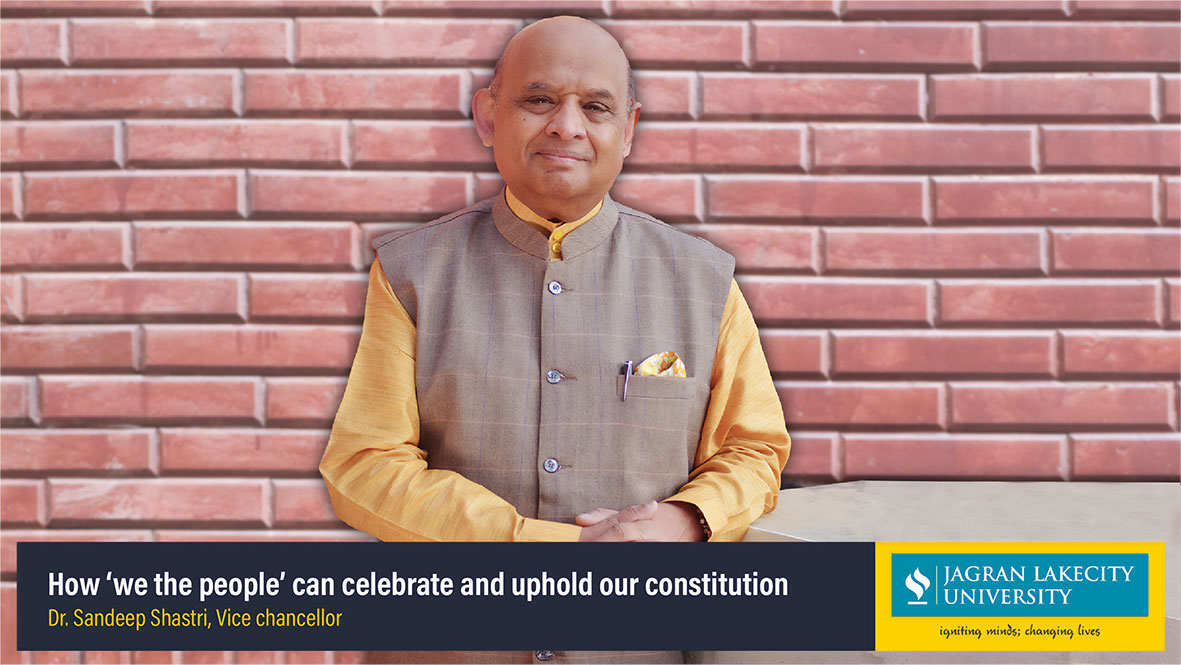As we all celebrate Constitution Day, it may be an appropriate moment to recall the solemn resolve outlined in the Preamble of Our Constitution. ‘We the People’ who gave unto ourselves a Constitution is deep with meaning and implications. It is ‘our’ Constitution no doubt.
The challenge with saying ‘our’ is that it is ‘everyone’s in general’ and ‘nobody in particular’! On Constitution Day, can our first resolution be to consider the Constitution as ‘my’ constitution and not merely ‘our Constitution’?
The Preamble also sketches out the ‘political architecture’ of Bharat – a ‘Sovereign, Socialist, Secular, Democratic Republic’. Here, too, each of these works merit deeper engagement and understanding. Let me begin with these words in a random manner.
Let us choose democracy first. The ‘idea’ of democracy is deeply entrenched in the minds of the citizens as something non-negotiable. That is how it surely should be. Yet, on Constitution Day, can we pause to ask ourselves the deeper ‘imagination’ that we have for our democracy?
Is it about merely being an ‘Electoral Democracy’? Can we also think of making it a more substantive democracy? Studies done by CSDS- Lokniti have consistently shown that for citizens of this country, the imagination of democracy is essentially about justice and welfare.
While liberty and equality are critical, the ‘welfarist’ and ‘equity’ angle of democracy is considered equally important by the citizens. One of the challenges of our ‘democracy experiment’ has been to translate the ‘promises of democracy’ into ‘practices of democracy’.
A Republic we became with the inauguration of our Presidency. The fact that we have an elected Head of State was an assertion of our spirit of independence and the strength of our democracy. Our being a Republic also entails a commitment to the values of a Republic.
These include, citizens choosing their leaders to articulate and represent their interests. While this process of choosing representatives who would mirror our aspirations and expectations is work in progress , it calls for a focus not merely on citizens’ role in elections as voters, but opportunities and avenues for citizen participation between elections.
We became a sovereign nation with our independence, but the term truly requires a searching second look in the light of globalisation. Today, the collapse of many formal boundaries with the spread of globalisation ably supported by the digital revolution, has redefined the concept of ‘space’. Today, when we talk of ‘Atma Nirbhar Bharat’, the focus needs to be on self-reliance of the mind.
Are we mental prisoners of external ideas and beliefs or do we draw out strength and pride from our ingenuity, creativity and innovation? We focus too much on self-reliance from the prism of our fiscal, technological and materialistic life but focus little on the emancipation of the mind.
There has been a long debate now on whether it is still relevant to use the word socialist in the light of liberalisation, privatisation and globalisation. This debate seems to have a misdirected focus.
If socialist is about economic equity, then the term continues to be relevant. It is increasingly becoming evident, especially after Covid-19, that the state is not merely a facilitator but is seen by citizens as a provider.
A significant chunk of the community of citizens depend on the state for some of their basic needs. In that context, the word socialist continues to be relevant and the corner stone of our political architecture.
And now finally to the word secular. Venturing into a debate on the term would merit a separate essay. On Constitution Day, it may be useful to focus on three dimensions: firstly, secular symbolising no state-sponsored religion; secondly, ensuring that the spirit of the ‘Right to Religion’ as enshrined in the Constitution is protected in letter and spirit; and thirdly in creating and sustaining an ecosystem for a genuine multi-religious society.
We as a nation and as a people, seemed to have somewhere lost track of these three goals. A re-commitment to these three norms is a vital necessity on Constitution Day.
Vice-Chancellor, Jagran Lakecity University
As published on Indiatoday



